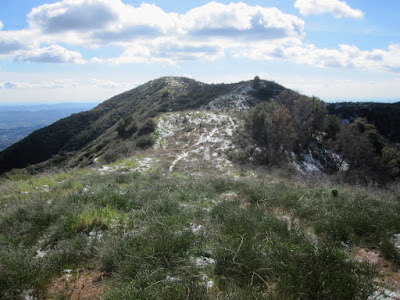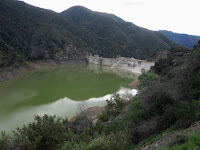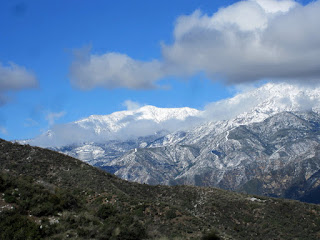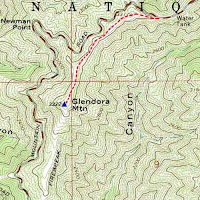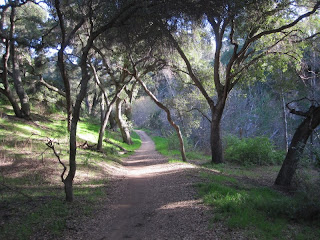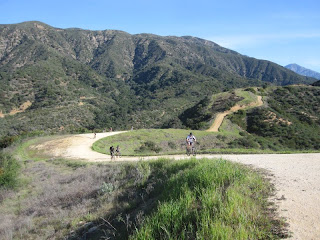 I watched carefully as they forecasted another winter storm hitting Friday into Saturday with snow dropping below the 1,000-foot level. The storm did hit and by Sunday the skies were clear, air was brisk, and there was plenty of snow on the mountains. I wanted to do a hike with great views of the snow-covered mountains, so I decided on Monroe Truck Trail and its two unnamed summits. And it had been five years since I hiked to them, so I figured it would be good to revisit. I drove from my home in Azusa to Little Dalton Picnic Area on Glendora Mountain Road (GMR) just above Glendora.
I watched carefully as they forecasted another winter storm hitting Friday into Saturday with snow dropping below the 1,000-foot level. The storm did hit and by Sunday the skies were clear, air was brisk, and there was plenty of snow on the mountains. I wanted to do a hike with great views of the snow-covered mountains, so I decided on Monroe Truck Trail and its two unnamed summits. And it had been five years since I hiked to them, so I figured it would be good to revisit. I drove from my home in Azusa to Little Dalton Picnic Area on Glendora Mountain Road (GMR) just above Glendora.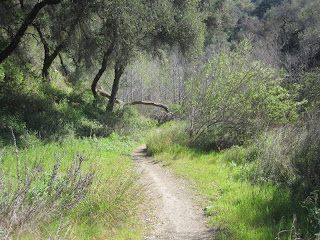 10:30 - Begin hike heading north on Lower Monroe Truck Trail. The name is a misnomer since this footpath heading along the bottom of Little Dalton Canyon has no semblance of ever being a truck trail. The air is brisk and sun feels good. I love the beauty and aromas after a rain. In my hike description I had mentioned "some boulder hopping along the way," but it did not prepare me for what I would encounter. A few minutes into the hike I arrive at my first creek crossing. The water is swift but I am able to cross with no difficulty. Minutes later the next crossing is deep and wide. I find a long, hefty tree branch to help stabilize me in the precarious crossing. I keep it. There are a total 11 crossings en route, really slowing down my pace and threatening to drench me nearly every time. I manage to safely ford each one. About a half mile in I stop to check out the old mine on the west bank...not much to see.
10:30 - Begin hike heading north on Lower Monroe Truck Trail. The name is a misnomer since this footpath heading along the bottom of Little Dalton Canyon has no semblance of ever being a truck trail. The air is brisk and sun feels good. I love the beauty and aromas after a rain. In my hike description I had mentioned "some boulder hopping along the way," but it did not prepare me for what I would encounter. A few minutes into the hike I arrive at my first creek crossing. The water is swift but I am able to cross with no difficulty. Minutes later the next crossing is deep and wide. I find a long, hefty tree branch to help stabilize me in the precarious crossing. I keep it. There are a total 11 crossings en route, really slowing down my pace and threatening to drench me nearly every time. I manage to safely ford each one. About a half mile in I stop to check out the old mine on the west bank...not much to see. 11:26 - Reach the end of the canyon-bottom route and switch back to the south and begin to climb the east slope of Little Dalton Canyon. Even though it was a truck trail at one time, nature has reclaimed this route and it has the feel of a single-track trail. The climb is gentle and views are expanding. Not much is bloom. Horry-leaved ceanothus and wild cucumber are the predominate blooming plants, with mountain lilac starting to make its appearance. Vehicles can be heard on GMR across the canyon, particularly motorcycles. Aside from a jogger and his dog and several mountain bikers, I enjoy relative solitude. To the north up canyon, Glendora Mountain comes into view, where I was last weekend.
11:26 - Reach the end of the canyon-bottom route and switch back to the south and begin to climb the east slope of Little Dalton Canyon. Even though it was a truck trail at one time, nature has reclaimed this route and it has the feel of a single-track trail. The climb is gentle and views are expanding. Not much is bloom. Horry-leaved ceanothus and wild cucumber are the predominate blooming plants, with mountain lilac starting to make its appearance. Vehicles can be heard on GMR across the canyon, particularly motorcycles. Aside from a jogger and his dog and several mountain bikers, I enjoy relative solitude. To the north up canyon, Glendora Mountain comes into view, where I was last weekend.  12:36 - At 2.3 miles from the start, I arrive at the junction with Upper Mystic Canyon Trail coming up from the south from Big Dalton Canyon. A happy sunflower greets me. Haze mutes the view of the urban sprawl to the south. To the east, snow-covered Ontario Peak pokes up over the ridgeline. The trail heads northeast pointing directly to summit 2760, my first summit destination for the day. I wander along at a causal pace and stop often to photograph plants and scenery. This cool day is perfect weather to hike this sun-drenched trail. After awhile the trail contours to the northwest across the southwest flank of summit 2760. In the canyon below I can see the trail I ascended. A lone blossom of California buckwheat makes an appearance; in a few months this creamy white flower will dominate the landscape here. I take a 20-minute break at a vista point. Now climb the switchbacks east. Encounter eight other hikers in four parties. The snow-covered high country to the north comes into view. Swing around the east side of the summit and up the use path on its north side.
12:36 - At 2.3 miles from the start, I arrive at the junction with Upper Mystic Canyon Trail coming up from the south from Big Dalton Canyon. A happy sunflower greets me. Haze mutes the view of the urban sprawl to the south. To the east, snow-covered Ontario Peak pokes up over the ridgeline. The trail heads northeast pointing directly to summit 2760, my first summit destination for the day. I wander along at a causal pace and stop often to photograph plants and scenery. This cool day is perfect weather to hike this sun-drenched trail. After awhile the trail contours to the northwest across the southwest flank of summit 2760. In the canyon below I can see the trail I ascended. A lone blossom of California buckwheat makes an appearance; in a few months this creamy white flower will dominate the landscape here. I take a 20-minute break at a vista point. Now climb the switchbacks east. Encounter eight other hikers in four parties. The snow-covered high country to the north comes into view. Swing around the east side of the summit and up the use path on its north side.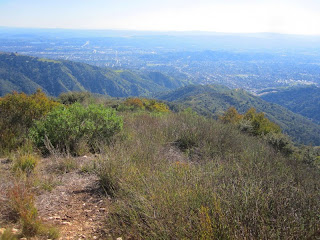 2:18 - Summit 2760. The unobstructed, 360-degree vista is striking. I'm concerned about the time. I still have several more miles and 800 feet of elevation gain to bag summit 3397 with a little more than 3 hours till sunset. I assess the situation and decided that I have enough time to continue on if I move at a good pace and don't doddle snapping plant photos. Leave the summit and continue northeast with earnestness.
2:18 - Summit 2760. The unobstructed, 360-degree vista is striking. I'm concerned about the time. I still have several more miles and 800 feet of elevation gain to bag summit 3397 with a little more than 3 hours till sunset. I assess the situation and decided that I have enough time to continue on if I move at a good pace and don't doddle snapping plant photos. Leave the summit and continue northeast with earnestness. I see the summit up ahead. The area has rebounded nicely since the 2002 Williams Fire. Chaparral is resilient. More views of the eastern high county open up. Mountain bikers heading downhill occasionally swoosh by me. I pass along the southwest flank of the summit, reach a hip, head northeast, and arrive at the ridge north of the summit. What a magnificent panorama from north to east! I take a right, walk past the apiary (no beehives are present) and climb the old firebreak south. It's not too steep.
3:19 - Summit 3397. I've made it. The broad peak offers commanding views of the heart of eastern San Gabriels. It's odd to me that this peak has no name. I have a bite to eat, tend my feet, and study the scenery. I'd like to linger longer but the sun is quickly dipping and I don't want to be finishing this hike in the dark with frigid winter temperatures.
 3:45 - Leave the summit and descend using the old firebreak south. This is the route I took five years earlier. It's a lot brushier now and some steep sections require vigilance. I reach the main trail in 23 minutes. The question is, Is this really a short cut? It took me 30 minutes ascending from here to the peak on the main trail. It would be faster of course coming down. So the time saved with the shortcut is negligible. I have made that observation over the years trying various "shortcuts."
3:45 - Leave the summit and descend using the old firebreak south. This is the route I took five years earlier. It's a lot brushier now and some steep sections require vigilance. I reach the main trail in 23 minutes. The question is, Is this really a short cut? It took me 30 minutes ascending from here to the peak on the main trail. It would be faster of course coming down. So the time saved with the shortcut is negligible. I have made that observation over the years trying various "shortcuts."4:35 - Arrive at the shortcut junction south of summit 2760. The route heads directly down an old, steep firebreak to intersect the main trail. Again, this is a situation where the distance is much shorter than taking the main trail, but is it actually time-efficient? I go for it. This short cut is quite steep with precarious footing. It takes me 15 minutes to reach the main trail. It took me 36 minutes ascending from here to the upper junction on the main trail. Probably could have done it in 25 coming down, so I saved maybe 10 minutes.
 Continue down the trail. The warm late-afternoon lights makes for nice photos. I arrive at Upper Mystic Trail junction at 5:13. Rather than returning via Little Dalton Canyon, my plan now is to descend the ridge via Poop-Out Trail. I know this is indeed a short cut, particularly with all the creek crossings in the canyon. I put on my fleece and gloves and begin my descent. Blue dicks and showy penstemon add to my blooming plant sightings for the day. The first half of the trial is pretty decent, but then it becomes crazy steep. The going is slow. I take a shot of the sun dipping out of sight at 5:43.
Continue down the trail. The warm late-afternoon lights makes for nice photos. I arrive at Upper Mystic Trail junction at 5:13. Rather than returning via Little Dalton Canyon, my plan now is to descend the ridge via Poop-Out Trail. I know this is indeed a short cut, particularly with all the creek crossings in the canyon. I put on my fleece and gloves and begin my descent. Blue dicks and showy penstemon add to my blooming plant sightings for the day. The first half of the trial is pretty decent, but then it becomes crazy steep. The going is slow. I take a shot of the sun dipping out of sight at 5:43.5:51 - Finish the hike, sort of. Poop-Out Trail deposits me at the intersection of GMR and Big Dalton Canyon Road, 0.8 mile from my car. I saunter slowly up the road, snack on trail mix, and reflect on a thoroughly enjoyable outing.
(Detailed trail guide includes driving directions, recommended season, map, notes, links, and photos): Mystic Canyon Trail & Lower Monroe Road to Summit 2760 and Summit 3397 (via Big Dalton Canyon)
